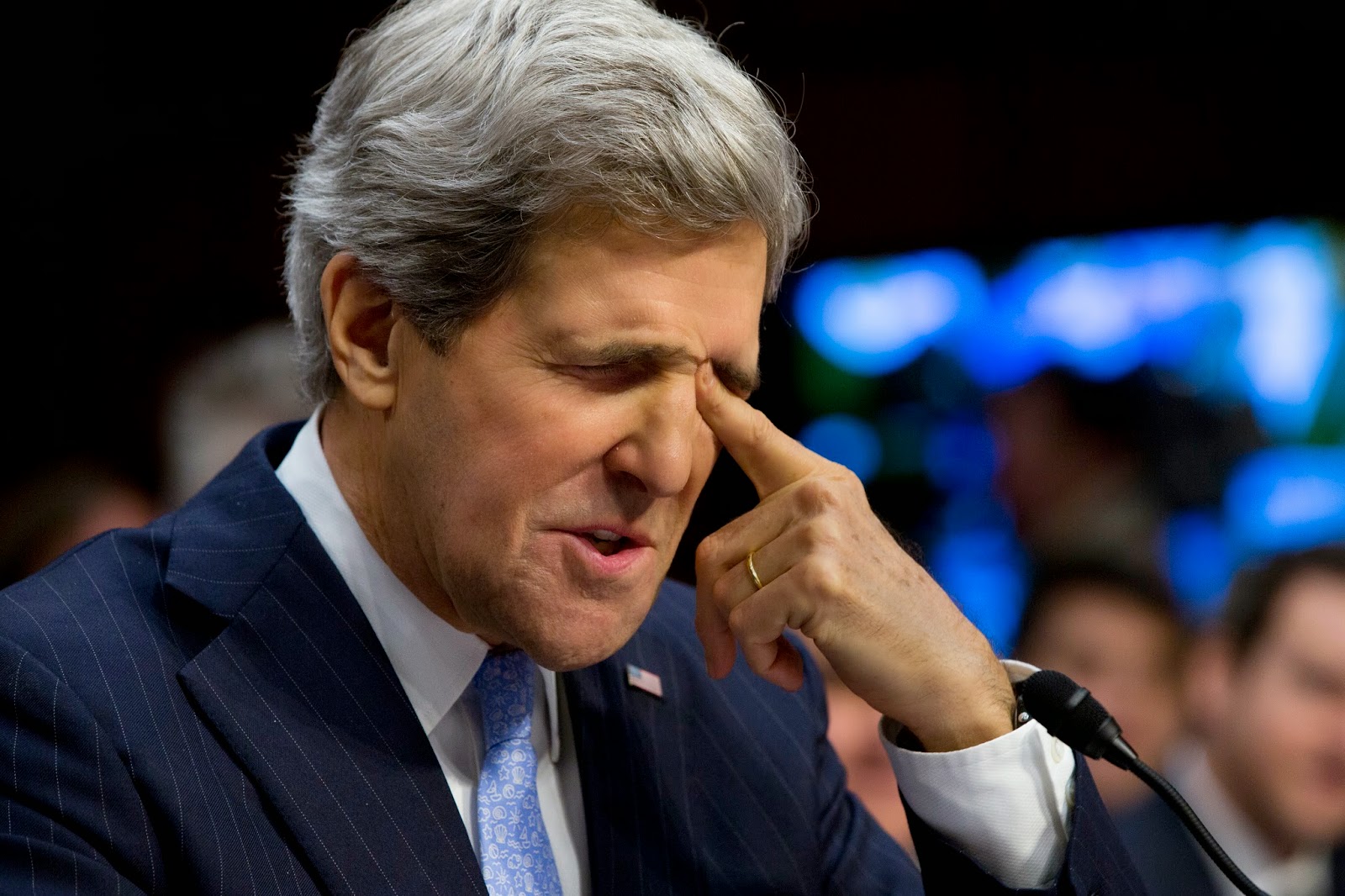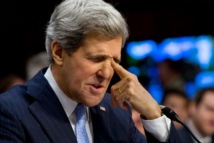With the region's focus on the conflict in Syria, where a Russian fighter jet was downed by Turkey, Netanyahu gave no sign he would acquiesce to the American expectation of concrete measures to ease the situation.
Netanyahu had told Kerry that the root of the current wave of violence was Palestinian "incitement on social media," and said that "civilian Palestinian projects" would be allowed to advance only when Israel experiences a "return of the quiet," an Israeli official said.
The premier also conditioned Palestinian construction in Israeli-controlled parts of the West Bank on international recognition of Israel's right to build in settlement blocs.
Ahead of meeting Netanyahu, Kerry condemned the wave of Palestinian attacks on Israelis since the start of October.
"Clearly, no people anywhere should live with daily violence, with attacks in the streets, with knives, with scissors, cars," he said.
"Today I express my complete condemnation for any act of terror that takes innocent lives."
Kerry also mentioned American victims of the attacks, with at least three US citizens -- two with dual citizenship and one from Kerry's home state of Massachusetts -- killed in the wave of violence that began on October 1.
But he made no mention of resolving the larger Israeli-Palestinian conflict in his remarks before the meeting amid US pessimism over whether significant negotiations can be held before President Barack Obama leaves office in little over a year.
After the talks with Netanyahu ended, Kerry spokesman John Kirby said the two discussed Syria and the Islamic State group as well as "steps that can be taken to stop the violence in Israel, Jerusalem and the West Bank".
The lack of specifics, at least publicly, regarding the Palestinians will likely disappoint Abbas, with Palestinian officials saying they were hoping Kerry would pressure Netanyahu.
In brief remarks after meeting Abbas in Ramallah, Kerry expressed sympathy for the Palestinians' "very dire" situation and concerns "about the violence," while stressing US committment to a Palestinian state.
"I am here at the request of President Obama to see what we can do to try to help contribute to calm and to restore people’s confidence in the ability of a two-state solution to still be viable, to be achieved at some point," Kerry said.
"We are committed to that two states with two peoples living side by side," he said. "The United States will continue to work as hard as possible to achieve that end."
The violence has left 92 Palestinians dead, including one Arab Israeli, as well as 17 Israelis -- including the two Israeli-Americans -- one American and an Eritrean.
Many of the Palestinians killed have been alleged attackers, while others were shot during demonstrations and clashes with Israeli security forces.
- Lone-wolf attacks -
The violence continued as Kerry arrived Tuesday, when a Palestinian wounded four Israeli soldiers as he rammed a vehicle into a group at a junction south of Nablus in the occupied West Bank.
Three Palestinian attackers -- including a teenage girl -- and an Israeli soldier died in violence Monday.
The stabbings, shootings and car rammings have mainly been carried out by "lone wolf" attackers who have defied Abbas's calls for peaceful resistance to Israel's occupation.
Many of them have been young people, including teenagers, reflecting anger and lost hope over Israel's occupation, the Palestinians' fractured leadership and the complete lack of progress in peace efforts, some analysts say.
Kerry has repeatedly called for both sides to take "concrete steps" to reduce tension and end provocative rhetoric, but his words have had little effect on the ground.
There is also little optimism he will be able to convince the Palestinian and Israeli leaders to resume peace talks, which broke down more than 18 months ago.
"There's no agreement to be reached between the parties right now," one senior US official said.
---------------------------------------------------------------------------------------------------------------------
Netanyahu had told Kerry that the root of the current wave of violence was Palestinian "incitement on social media," and said that "civilian Palestinian projects" would be allowed to advance only when Israel experiences a "return of the quiet," an Israeli official said.
The premier also conditioned Palestinian construction in Israeli-controlled parts of the West Bank on international recognition of Israel's right to build in settlement blocs.
Ahead of meeting Netanyahu, Kerry condemned the wave of Palestinian attacks on Israelis since the start of October.
"Clearly, no people anywhere should live with daily violence, with attacks in the streets, with knives, with scissors, cars," he said.
"Today I express my complete condemnation for any act of terror that takes innocent lives."
Kerry also mentioned American victims of the attacks, with at least three US citizens -- two with dual citizenship and one from Kerry's home state of Massachusetts -- killed in the wave of violence that began on October 1.
But he made no mention of resolving the larger Israeli-Palestinian conflict in his remarks before the meeting amid US pessimism over whether significant negotiations can be held before President Barack Obama leaves office in little over a year.
After the talks with Netanyahu ended, Kerry spokesman John Kirby said the two discussed Syria and the Islamic State group as well as "steps that can be taken to stop the violence in Israel, Jerusalem and the West Bank".
The lack of specifics, at least publicly, regarding the Palestinians will likely disappoint Abbas, with Palestinian officials saying they were hoping Kerry would pressure Netanyahu.
In brief remarks after meeting Abbas in Ramallah, Kerry expressed sympathy for the Palestinians' "very dire" situation and concerns "about the violence," while stressing US committment to a Palestinian state.
"I am here at the request of President Obama to see what we can do to try to help contribute to calm and to restore people’s confidence in the ability of a two-state solution to still be viable, to be achieved at some point," Kerry said.
"We are committed to that two states with two peoples living side by side," he said. "The United States will continue to work as hard as possible to achieve that end."
The violence has left 92 Palestinians dead, including one Arab Israeli, as well as 17 Israelis -- including the two Israeli-Americans -- one American and an Eritrean.
Many of the Palestinians killed have been alleged attackers, while others were shot during demonstrations and clashes with Israeli security forces.
- Lone-wolf attacks -
The violence continued as Kerry arrived Tuesday, when a Palestinian wounded four Israeli soldiers as he rammed a vehicle into a group at a junction south of Nablus in the occupied West Bank.
Three Palestinian attackers -- including a teenage girl -- and an Israeli soldier died in violence Monday.
The stabbings, shootings and car rammings have mainly been carried out by "lone wolf" attackers who have defied Abbas's calls for peaceful resistance to Israel's occupation.
Many of them have been young people, including teenagers, reflecting anger and lost hope over Israel's occupation, the Palestinians' fractured leadership and the complete lack of progress in peace efforts, some analysts say.
Kerry has repeatedly called for both sides to take "concrete steps" to reduce tension and end provocative rhetoric, but his words have had little effect on the ground.
There is also little optimism he will be able to convince the Palestinian and Israeli leaders to resume peace talks, which broke down more than 18 months ago.
"There's no agreement to be reached between the parties right now," one senior US official said.
---------------------------------------------------------------------------------------------------------------------









 Home
Home Politics
Politics











